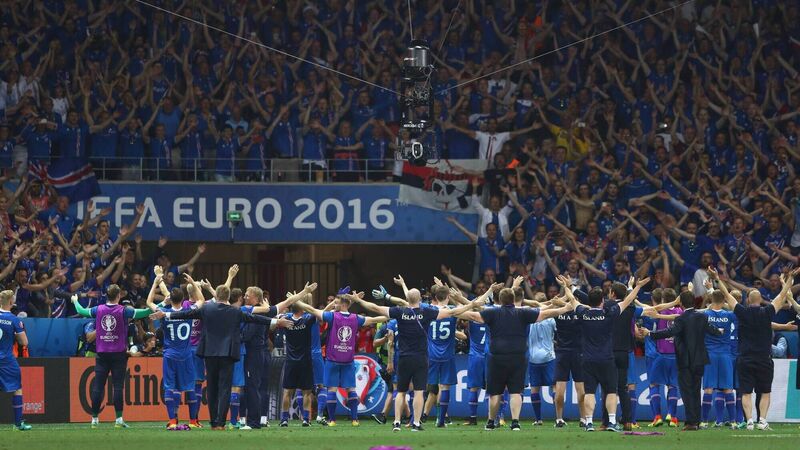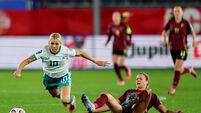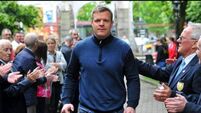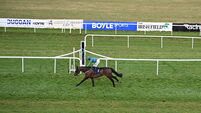Ireland can look to Iceland and Norway for new player development pathway

Iceland players celebrate their team's 2-1 win over England in front of the supporters during their UEFA EURO 2016 round of 16 match at Allianz Riviera Stadium, France. Iceland improved their national team with a decades-long programme improving their grassroots structures. Picture: Lars Baron/Getty Images
THE defeat to Luxembourg was a new low point in the national side's nosedive in performance and results. The Qatar draw only adding to the now 11 games without a win statistic.
As we predicted, any bad result would put manager Stephen Kenny tenure in a precarious position but that most people's opinion of the manager was generally sympathetic due to the bad luck and the lack of available talent that has haunted his time in charge.
The consensus is that we can't continue to do the same things and expect better or even the same results. Playing Qatar, days after the Luxembourg defeat, smacked of the FAI's old standard pointless Oman international we've all come to love and sleep through.
Calls to address the country's underlining problems are not new but still seem beyond the scope of the FAI and stakeholders to address. You've heard them all before and include the obvious solutions ranging from grassroots development to promoting our domestic league. If the process to establish a better platform for the future of the game here is beyond the capability of football's stewards in Ireland then they could do a lot worse than copying the achievements of some of our neighbours.
Iceland has a population of 350,000, significantly smaller than County Cork but created a period of footballing success that a nation of several million would be proud of.
In the past two decades, Iceland set about building indoor facilities across the country so that children and adults alike could play the year through without stopping for their harsh winters. Then ensured 70% of all coaches in the country would have at a minimum a UEFA B coaching licence, while 35% have completed their UEFA A coaching certificate. That's coaches at all levels, from schoolboy to international level. It is also expected that most coaches have at least a bachelors degree in sport and exercise before they even consider taking up coaching?
Icelandic clubs actively promote their young players to first-team football from the age of 16. They will not play all the games in the season but they train and share the experiences of the first team and are not segregated to an academy.
Because Iceland has such a small pool of players to choose from, they do not throw anyone that seems not to be making the grade on the scrapheap. They make the most of what they have by encouraging unorthodox players and late developers to stick with it. As a result, they have arrived at the extraordinary point that saw the town of Westman, population 4,500, (situated on a small island off the coast of Iceland) produce 10 professional footballers (men and women) in the past 30 years. A return few if any town across Europe could replicate.

They were also lucky in the manager they had. Lars Lagerback is regarded as a traditionalist for his liking of the old 4-4-2 formation. And while he does favour the now often disparaged line-up, he gets around anyone who might think they have the measure of him by instilling a flexibility in his sides that can adjust formations in an instant to 4-5-1 or 4-2-3-1 if the second striker drops deep. It can turn into a 4-1-3-2 if a central midfielder comes forward and a 4-3-3 if two wingers join the striker. This flexibility was one of the driving factors behind Iceland’s success in the Euro championships.
Lately, Iceland have not had the best qualification run and that has been put down to the departure of longtime manager Lagerback to take over Norway. But his absence has been noted and he has since returned to Iceland as an advisor.
Norway was similar in many ways to Ireland of late. Many of their top players head to Britain to ply their trade and like Ireland, they have recently fallen on hard times. The advantage they have over us is that they still have a functioning and relatively successful domestic league and some really exciting talent coming through.
In July 2017, Norway sat at 88th place in the FIFA World Rankings, over 50 places behind Ireland. They are now ranked 44th just behind the Republic which is now heading in the opposite direction.

Then there is their talent. With Erling Haaland in their ranks, they have the potential to do anything. The 20-year-old wunderkind is blowing the minds of clubs across Europe with his performances at Borussia Dortmund, which has everyone from Man City and PSG to Barcelona ready to break the bank to get his signature.
Haaland's rise to the top is similar to the Icelandic process of blooding young players with senior teams and at the age of just 15 was put into play with his hometown club's reserve team, Byrne 2, where he immediately proceeded to score 18 goals in 14 matches.
The point of all this is that while the rehaul of Irish soccer will be difficult it is not impossible. Other nations have gone through it and are going through it now. None of it is rocket science, it just requires the will to accept the hard decisions and do your best for the future while getting the best out of the players you have now.







 App?
App?







